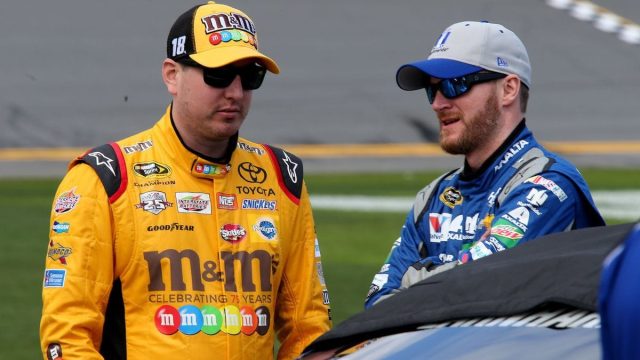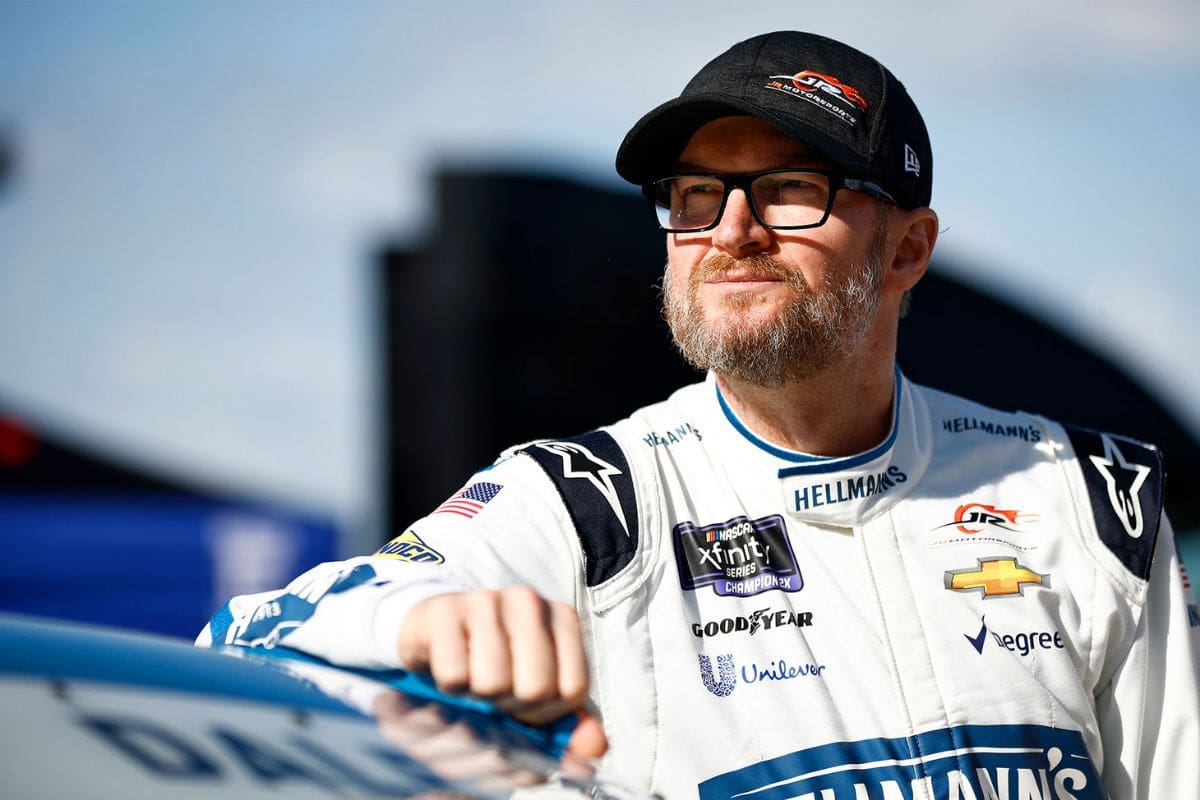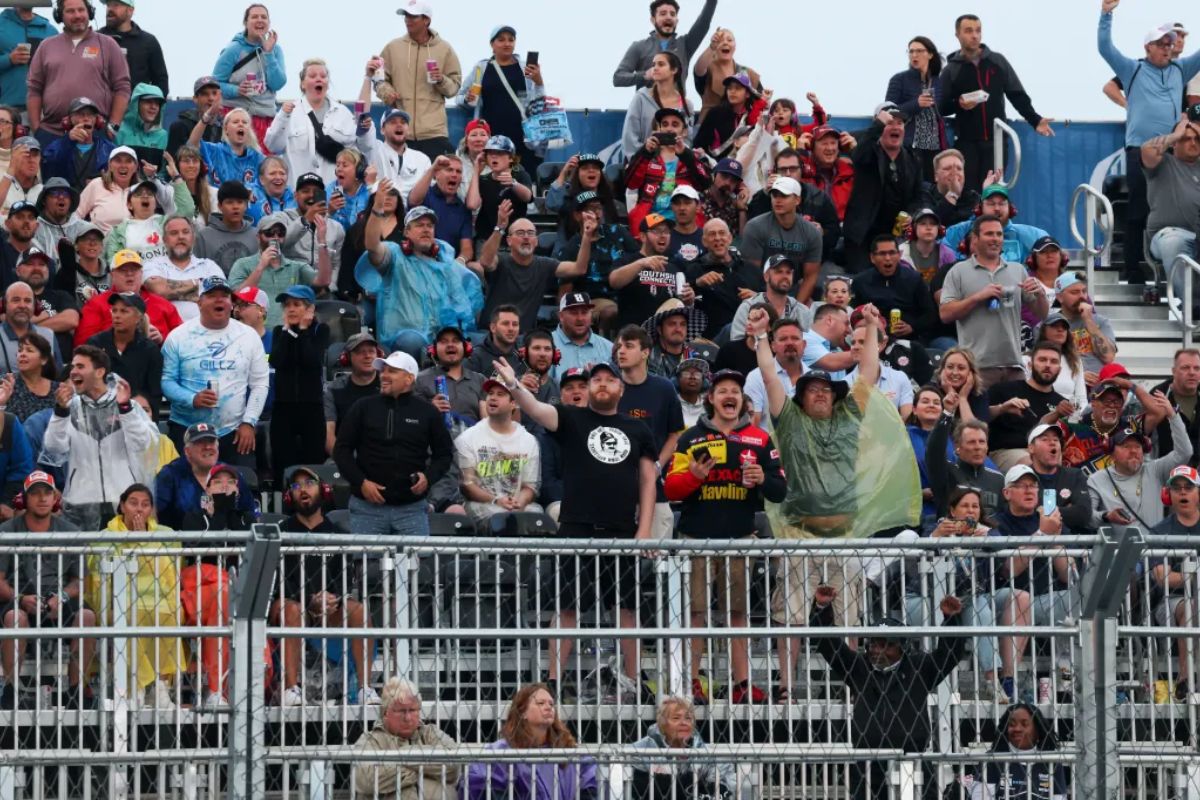Dale Jr. and Kyle Busch’s Feud: The 2008 Richmond race stands as a defining moment in the tumultuous rivalry between Dale Earnhardt Jr. and Kyle Busch, revealing not only the raw emotions of competitive racing but also the intricate dynamics that underpin NASCAR’s fan culture. Busch’s decisive action against Earnhardt ignited a firestorm of reactions, reshaping public perception and deepening the rivalry that has captivated audiences for years. As fans continue to dissect the implications of this incident, the broader questions surrounding rivalry in sports culture emerge—what does this feud reveal about the nature of competition, loyalty, and the legacy of these two drivers?
Key Highlights
- The Richmond 2008 race marked a pivotal moment in the Earnhardt-Busch rivalry, with Busch’s aggressive nudge upsetting Earnhardt Jr.’s race strategy.
- The incident resulted in Earnhardt finishing 15th, escalating tensions and showcasing the personal stakes involved in their competitive relationship.
- Media coverage polarized fan opinions, with some praising Busch’s tenacity while others criticized his lack of respect for Earnhardt.
- Over a decade later, both drivers publicly reconciled, discussing their past grievances on Earnhardt’s podcast, indicating personal growth.
NASCAR’s Historic Feud: Dale Earnhardt Jr. vs. Kyle Busch
The rivalry between Dale Earnhardt Jr. and Kyle Busch stands as a significant chapter in NASCAR history, embodying the intense competition and emotional stakes that define the sport. This feud, rooted deeply in the 2000s era, serves as a case study in the dynamics of driver relationships, team politics, and the fervor of fan engagement.
The narrative began to unfold in earnest during the 2008 season when Hendrick Motorsports, faced with the decision to replace Kyle Busch with Earnhardt Jr., captured the attention of fans and analysts similarly.
Both drivers, though talented, represented contrasting personas: Earnhardt Jr., the beloved son of a NASCAR icon, and Busch, often viewed as the brash upstart. Their rivalry was fueled not only by the stakes of competition but also by the undercurrents of team dynamics and personal ambition. The decision to favor Earnhardt Jr. over Busch was symbolic of the shifting sands within one of NASCAR’s most esteemed franchises, highlighting the complexities of driver selection and the implications for team chemistry.
Moreover, the unresolved disputes on the track escalated tensions, leading to a public fallout that included alarming instances of death threats directed at Busch. This volatile atmosphere illustrated the extremes of fan loyalty and the psychological burdens borne by drivers.
The Canon Event: Richmond 2008
Richmond 2008 marked a significant moment in the escalating rivalry between Dale Earnhardt Jr. and Kyle Busch, as a seemingly innocuous on-track action ignited a fierce animosity that would resonate throughout the NASCAR community. The incident occurred during a critical race when Busch, sensing the threat of losing, made a calculated decision to nudge Junior, ultimately disrupting his race strategy. While the event did not culminate in a catastrophic crash, its implications were profound.
Busch’s action pushed Earnhardt Jr. from a competitive position, leading him to finish in a disappointing 15th place, while Busch secured another. The aftermath of the incident revealed not just the competitive instincts of both drivers but also the emotional stakes involved. Dale Jr., a beloved figure in NASCAR, was visibly upset, marking this moment as one of the initial instances of their rivalry escalating to the brink of physical confrontation.
This one was a canon event.@KyleBusch | @DaleJr pic.twitter.com/SoxCNRgjRh
— NASCAR (@NASCAR) August 8, 2024
The incident transcended the race itself, as it became a focal point for fans and media, embodying the passion and intensity that defines NASCAR. It also highlighted the pronounced contrast in personality between Earnhardt, known for his affable demeanor, and Busch, who often adopted a more aggressive racing style.
Reactions and Media Responses
Reactions to the incident between Dale Earnhardt Jr. and Kyle Busch revealed a deep divide among fans and analysts, as opinions polarized over the appropriateness of Busch’s aggressive tactics on the track.
Busch’s unapologetic stance, stating that he wouldn’t allow another driver to win simply because of their lengthy winless streak, resonated with a segment of the fanbase that values competitive integrity. Conversely, Earnhardt’s assertion that Busch would need ‘security from all of us’ highlighted the emotional weight of the situation, inciting fervent responses from Junior’s supporters who felt betrayed by Busch’s actions.
“You know if I was just going to lay back and let a guy win a race because he hasn’t won in 71 starts or whatever, it wouldn’t be me; that wouldn’t be racing.” – Busch
Media coverage amplified this discord, with commentators dissecting each driver’s perspective. Some lauded Busch for his tenacity, framing his actions as representative of racing’s cutthroat nature. Others, however, criticized him for lacking respect for his competitors, especially a fan-favorite like Earnhardt Jr., who represented a nostalgic connection to the sport’s heritage.
“Whether it’s fair or not, he’s going to need security from all of us.” – Junior
“When it happened, everybody told me I was number 1 for some reason, but Clint Bowyer was in front for some reason.” – Busch
The incident sparked a flood of social media commentary, where fans passionately articulated their stances. Many took to platforms to express outrage at Busch, while others defended his right to race hard. The pronounced contrast in reactions highlighted not only a rivalry between two prominent drivers but also the broader cultural rifts within NASCAR fandom.
The Feud’s Legacy and Reconciliation
This feud between Dale Earnhardt Jr. and Kyle Busch has left an indelible mark on NASCAR, shaping not only their own careers but also the narratives surrounding competitive spirit and sportsmanship within the sport. The incident at Richmond became symbolic of the intense rivalries that define NASCAR, illustrating how personal conflicts can escalate and impact broader team dynamics. For Earnhardt, this feud coincided with crucial moments in his career, culminating in a victory shortly after the altercation, which ultimately showcased his resilience and ability to overcome adversity.
Over a decade later, the reconciliation between Earnhardt and Busch signals a maturation in their respective approaches to competition. Their decision to publicly address the feud on Earnhardt’s podcast not only illustrates personal growth but also reflects a broader trend within NASCAR towards fostering friendship among its drivers. This dialogue serves to bridge the gap between past grievances and present realities, emphasizing the importance of communication in resolving conflicts.
However, the legacy of their feud lingers, especially among fans. The passionate responses from their respective fandoms highlight the deep emotional investments that rivalries evoke. While the drivers have moved forward, the incident remains a touchstone for discussions about rivalry and respect in NASCAR.
Fan Reactions and Current Status
The evolving landscape of fan sentiment surrounding the feud between Dale Earnhardt Jr. and Kyle Busch reveals a complex interplay of loyalty and grudges that continues to shape their legacies in NASCAR.
“Me and Kyle have had a bit of a history on the racetrack but have since, you know, become pretty good buds. But our fan bases are still having a hard time understanding us being in the same room. “
“The fans? Hard to say. Some of mine are now Kyle fans—some of them. We call them unicorns. Some of them still hold grudges, though. You know, your fans are passionate, and they don’t forget anything. Some of them don’t get over it.” – Junior
While both drivers have reconciled over the years, the passionate fan bases remain a crucial factor influencing perceptions of the rivalry. The recent podcast featuring both drivers highlighted the ongoing challenges in shifting fan attitudes, with Dale Jr. acknowledging the divide that still exists.
- Loyalty Divides: Many fans remain staunchly loyal to their chosen driver, often viewing the feud through a lens of historical grievances.
- Forgiveness vs. Forgetting: Although some fans have softened their stance towards Busch, the deeper emotional scars from past incidents linger, complicating any move towards unity.
Dale Jr. articulated this dynamic succinctly, noting the passionate nature of their supporters and the difficulty in reconciling historical feelings with present realities.
News in Brief: Dale Jr. and Kyle Busch’s Feud
The rivalry between Dale Earnhardt Jr. and Kyle Busch, exemplified by the Richmond 2008 incident, serves as a compelling study of competitive dynamics within NASCAR.
This clash not only intensified their personal feud but also illuminated the broader cultural implications of such rivalries, fostering deep divisions among fanbases.
The enduring narrative surrounding this conflict continues to resonate, highlighting the significance of passion and emotion in the world of motorsports, while also hinting at the potential for eventual reconciliation.
ALSO READ: Dale Earnhardt Jr.’s New Image Surfaces: NASCAR Fans Are Craving More!



